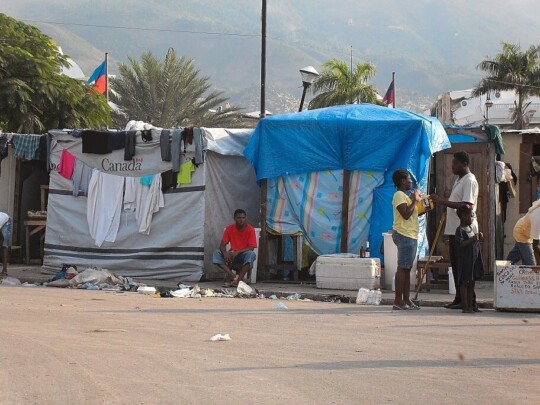Peter Schweitzer
Cover Letter Plenty Bulletin Spring 2010, Vol. 26, No. 1
When Plenty decided to respond to the earthquake in Guatemala in February of 1976, we knew virtually nothing about the country, about the Mayans, about the US-backed military rulers or even, exactly, where Guatemala was. There was barely any US press coverage. Plenty’s most advanced means of international communication other than the telephone was our ham radio.
Fast-forward to the ten-times more deadly earthquake in Haiti this past January 12. That night we were seeing video of the horror. Within days, millions of dollars were being pledged by people using their cell phones. Hundreds of first-hand reports were available on the Internet with thousands of photos. The Plenty office was receiving emails from medical volunteers wanting to go to Haiti. The post-Katrina relief network that we had gotten involved with jumped up and started planning and raising money. We began to read about Haiti on the Web and study its history.
We learned about the oppressive response of the slave-trading nations of the world such as the US, France and England, to the new free Nation of Haiti after the slaves booted out their French masters at the end of the 18th Century. We began to understand the deep and common historic cultural and economic ties that bind Haiti and New Orleans and the connection of Haiti to the Louisiana Purchase and the US Civil War.
We remembered that Plenty volunteers went to Haiti in 1980 and worked in Mother Teresa’s Home for the Destitute and Dying in Port-au-Prince. “Baby Doc” Duvalier was the corrupt President having inherited the post from the hated and feared “Papa Doc.” One of the volunteers reported seeing Baby Doc riding along a street in Port-au-Prince tossing coins out of the limousine window as little kids scrambled to pick them up. Baby Doc siphoned off millions of dollars of the foreign aid directed to Haiti and was finally forced into exile in France in 1986. It has been reported by human rights groups that 40,000 to 60,000 political opponents were killed in Haiti during the 29 years that “Papa” and “Baby Doc” were in charge.
When massive earthquake turned Haiti’s overcrowded capital into a deadly avalanche of rubble, Haiti was already the most impoverished country in the western hemisphere with 70 percent unemployment and 97 percent deforestation and an infant mortality rate of 60 per thousand births (compared to the US at six per thousand).
Haiti’s stark inequalities are highlighted by the facts that half of the country’s wealth is controlled by one percent of the people and 75 percent of the farmable land is owned by 5 percent. All this, in spite of the fact that Haiti has been described as “The Republic of NGOs” because so many nonprofits operate there. There were said to be 4,000 NGOs before the quake, a number that has swollen to 10,000 since.
Before the 1980s Haiti was self-sufficient in rice. Then, the IMF, in return for a multi-million dollar loan, required that Haiti reduce all import tariffs, and soon the market was flooded with cheaper, US-subsidized rice and Haiti’s rice farmers were wiped out. Some call this “Free Trade.”
The beauty of evolving from the ham radio to the internet is that millions of people, including government bureaucrats and the staffs of big aid agencies, were also looking at the same history and what we’re seeing is a gratifying recognition of past mistakes and a commitment to do things differently. Even Haitian Government planners and USAID bureaucrats are talking about sustainable agriculture. They’re focusing on food self-sufficiency and moving away from an urban-based sweatshop economy to a more decentralized economy, repopulating rural Haiti and reclaiming eroded lands.
The Haitians we’re talking to are asking for our assistance in promoting primary health care and installing potable water systems. They want solar and other forms of alternative energy. Primarily, they are asking us to let Haitians take the lead. We learned from Guatemala where four years of intensive international aid after the ‘76 earthquake was wiped out by the decade of violent repression that followed. We learned from Katrina where billions of dollars of promised federal aid disappeared down the rabbit hole and never reached the folks that were supposed to be helped. Maybe, just maybe, we can be a little smarter, a little wiser, in Haiti. Right now there is a great deal of good will and a raft of good intentions. Inevitably, old patronizing habits will be hard to break but, the Haitian people have absorbed just about the hardest punch nature can deliver and they’re still standing. It seems like the least we can do is help them get the tools they need to rebuild their lives.
